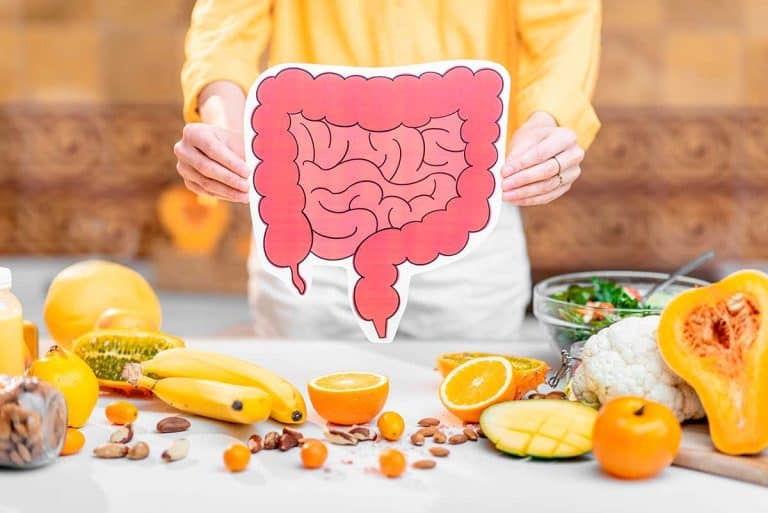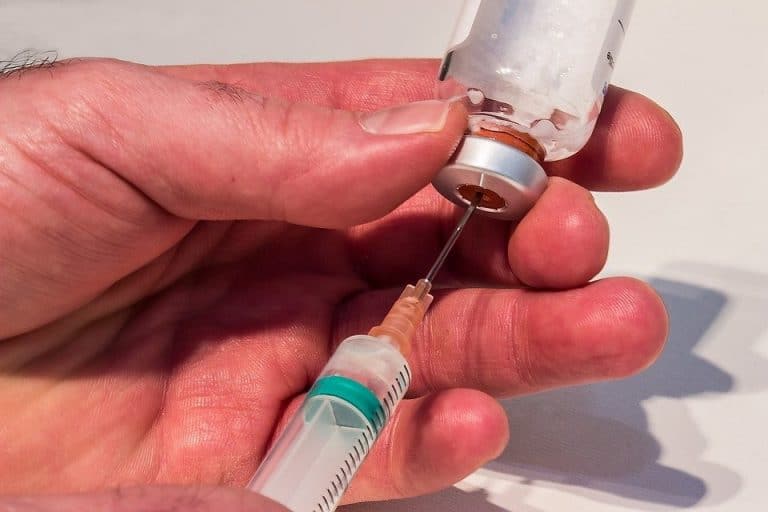What role does the microbiome play in human health and disease?
Microbiome 101
Did you know there are more bacteria and other microorganisms in your gut than any any other part of the body?
Researchers estimate that the amount of genetic material from these organisms is around 200 times more than that of human cells. Collectively, it weighs an enormous 5 pounds (1).
The microbiome comprises the genetic material of all the microscopic organisms present in different parts of the body. These organisms include not only bacteria but also fungi, viruses, and other organisms.

Photo credit: https://pixabay.com/photos/bacteria-disease-escherichia-coli-62993/
The Human Microbiome Project (HMP) started in 2007 by the U.S. National Institute of Health (NIH). It aims to define the complete genetic makeup of our microbiome and its relation to our body. HMP is working towards understanding the relationship between the microbiome and overall health.
Microbiome vs microbiota- Is There a Difference?
The microbiome is the genes and genetic material of all the organisms present in a human.
Microbiota are the organisms present on or inside the human body at a specific place or as a whole.
Although these terms mean relatively two different things, they are used interchangeably.
We will mainly focus on the gut microbiota in this article.
Where is microbiome found in humans?
We find the human microbiome in (2):
- Skin
- Gastrointestinal Tract
- Oral Mucosa
- Biliary tract
- Mammary glands
- Conjunctiva
- Lungs
- Uterus, ovarian follicles, and vagina
- Seminal Fluid
What Factors Affect Your Microbiome?
Your microbiome exists in a delicate balance with your body cells. It means these bacterial and viral species exist in a specific proportion. An imbalance in the microbiome, called dysbiosis, opens door to countless diseases.
Several factors affect the health of your microbiome. These factors include (3):
Age
Researchers believe that the microbiome first develops at birth. However, there is some evidence of that happening during the pregnancy as well. The microbiome of a child reaches the 40-60% similarity with the normal adult microbiome at around three years of age. It remains stable and consistent through the 3rd to 7th decade of life. Later, it incurs slight changes at old age, which make an individual susceptible to DNA alteration, malabsorption, and immune deficiency, etc.
Diet
Researchers believe that the most important factors affecting the microbiome of a child are diet and nutrition. There is a remarkable difference between the gut flora of a breast-fed and formula-fed infant. Formula feed lacks several bioactive substances that help in microbiome maturation. These substances also help the child in nutrition digestion, absorption, immune protection, and antimicrobial defense.
Diet plays a significant role throughout adulthood as well. Researchers have noticed individual changes in the microbiome based on the geography of a person and the season of the year, which links to change in eating habits for most parts.
Antibiotics
Unwarranted use of antibiotics drastically affects the microbiome. The problem with antibiotics is that they cannot differentiate between bad organisms. While antibiotics kill pathogens, they destroy a variety of probiotic microbiome as well.
Probiotics
New disease treatments focus on treating the microbiota rather than the pathogen itself, which then naturally fights the infection. Probiotics are one such treatment option, which introduces or improves our normal microbiome and are used to treat conditions such as IBD, diarrheal diseases, metabolic disorders, and so on.
The Role of Gut Microbiome in Maintaining Optimal Health
Let us focus on the essential roles of the gut microbiome for now.
We have talked about the gut microbiome and its crucial role in overall health only a decade ago. While our knowledge is still developing, here is what we know so far about the role of the gut microbiome in promoting good health.

Photo credit: https://pixabay.com/illustrations/medical-hospital-icons-doctor-4510408/
# 1: Gut Microbiome is Essential for Food Digestion
Our guts can’t digest a variety of food components, such as fiber when it lacks the enzymes needed to help with digestion. The gut microbiome digests these food components and converts them into chemicals, such as butyrate. The intestinal cells use butyrate as a key energy source. Butyrate also triggers glucose synthesis (called gluconeogenesis) in the gut cells. This process provides energy for the whole body (4, 5).
# 2: Gut Microbiome is Crucial for microbiota-Gut-Brain Axis
The microbiota-gut-brain axis is a complex cross-talk between the gut bacteria, nerves inside the gut (enteric nervous system), and the brain. This complex system tightly links the health of the gut microbiota to the gut and brain health. An imbalance in the gut microbiota causes an imbalance in this axis and results in inflammation. It can also result in a leaky gut (where it lets pathogens cross the gut barrier) and several brain conditions such as Alzheimer’s. The gut microbiota plays a pivotal role in maintaining the health of the gut and brain (6).
# 3: Gut Microbiome Offers Protection Against Pathogens
A healthy gut microbiota keeps the number of pathogens in check. One mechanism is the simple element of competition between the bacteria. The good bacteria are greater and do not let the bad bacteria thrive. In addition, the gut microbiota employs several important mechanisms to keep the number of bad bacteria under check. These include the secretion of antimicrobial compounds and immune-boosting immunoglobulins (7, 8).
# 4: Gut Microbiome Improves the Body’s Immune System
The gut microbiome plays an important role in immune modulation. The gut microbiome starts several processes that allow in the maturation of immune mediating cells, such as T-lymphocytes, plasma cells, and macrophages. Once these cells are mature, they are better capable of identifying and targeting pathogenic organisms (9).
# 5: Gut Microbiome Influences Several Metabolic Processes
The gut microbiome has a powerful influence on important metabolic processes. For example (10, 11, 12):
- The gut microbiota releases Small Chain Fatty Acids (SCFAs) during food digestion. These SCFAs help in lipid metabolism and lower the levels of cholesterol.
- SCFAs also help in gluconeogenesis in the liver and improve energy hemostasis in the body.
- The gut microbiome also improves insulin resistance and lowers the chances of diabetes and obesity.
- The gut microbiome also controls the release of appetite hormones from the brain and food metabolizing hormones from the gut cells.
# 6: Other Health Benefits
The list of effects the gut microbiome has on human health is truly endless. Here are some additional health benefits (13):
- The gut microbiome reduces the overall oxidative stress and the risk of diseases linked with it.
- It reduces inflammation in the body and the conditions associated with it.
- It helps clear away the toxins and reduces the load of toxin clearance on body organs such as liver and kidneys.
Role of Microbiome in Disease
Again, we will focus on the gut microbiome only. The gut microbiome dysbiosis and its link to disease is now an increasingly recognized phenomenon.
Here is how gut microbiome dysbiosis links to different diseases (13, 14).
C. difficile Infection: It occurs when there is an imbalance in the normal microbiome following the use of antibiotics. C. difficile is a pathogenic bacteria that causes severe diarrheal infection. A fecal transplant is a proven remedy for this infection as it restores the microbial balance.
Cardiovascular Disease: There is increasing evidence linking the gut microbiome to cardiovascular disease. This is likely because of atherosclerosis and reduced lipid breakdown following microbial imbalance.
Inflammatory Bowel Disease and Syndrome: Probiotic supplements have limited FDA-approved uses. Using probiotics for Inflammatory Bowel Syndrome (IBS) and Inflammatory Bowel Disease (IBD) are some of the FDA-approved uses. The gut microbiome dysbiosis is the key pathology in both disorders.
Metabolic Disorders: As mentioned, the gut microbiome assists in several metabolic processes, including glucose regulation and lipid metabolism. The gut microbiome dysbiosis can lead to heightened inflammation, impaired lipid breakdown, and insulin resistance. This results in conditions such as metabolic syndrome, diabetes, and obesity.
Microbiota-Gut-Brain Axis Disorders: The gut microbiome dysbiosis leads to increased oxidative stress and inflammation affecting the gut and the brain. It results in leaky gut and brain disorders such as Parkinson’s, Alzheimer’s, dementia, and more.
Other Conditions: In addition, intestinal microbiome dysbiosis results in conditions such as rheumatoid arthritis, eating disorders, thyroid disorders, and even cancers (colorectal cancer).
FAQs
Why is the microbiome important to human health?
These microorganisms help us digest food, lower the levels of oxidative stress, reduce inflammation, fight infections, improve hormonal imbalance, strengthen the immune system, and suppress the risk of several diseases.
How does human gut microbiota affect the normal functioning of the body?
Bacteria present inside our intestines, known as gut microbiota, perform several vital functions. They help to digest food, protect you from gut pathogens, heighten gut immunity, improve metabolic health, and reduce the risk of diseases affecting the brain, gut, and other body parts.
How does the human microbiome protect the host from infection?
The human microbiome blocks the growth of harmful organisms. They do so by competitively fighting, outgrowing, and occupying the places from where pathogens can enter. They also improve and boost our Immune system by increasing the production of different protective biochemicals such as immunoglobulins and cytokines.
Where is the microbiome found in humans?
The microbiome exists in places like skin, gut, genital tract, lungs, mammary glands, seminal fluid, and conjunctiva of the eyes.
How does the microbiome influence the immune system?
The microbiome plays an important role in modulating the immune system. These organisms work in synchronization with the natural immune system of the body. They help produce immunoglobulins and cytokines- chemicals that help fight dangerous pathogens.
References
1. Sender, R., Fuchs, S., & Milo, R. (2016). Revised Estimates for the Number of Human and Bacteria Cells in the Body. PLoS biology, 14(8), e1002533. https://doi.org/10.1371/journal.pbio.1002533
2. Ursell, L. K., Metcalf, J. L., Parfrey, L. W., & Knight, R. (2012). Defining the human microbiome. Nutrition reviews, 70 Suppl 1(Suppl 1), S38–S44. https://doi.org/10.1111/j.1753-4887.2012.00493.x
3. Hasan, N., & Yang, H. (2019). Factors affecting the composition of the gut microbiota, and its modulation. PeerJ, 7, e7502. https://doi.org/10.7717/peerj.7502
4. Wong JM, de Souza R, Kendall CW, Emam A, Jenkins DJ. (2006).Colonic health: fermentation and short chain fatty acids. J Clin Gastroenterol, 40:235-43. doi:10.1097/00004836-200603000-00015 pmid:16633129
5. De Vadder F, Kovatcheva-Datchary P, Goncalves D, et al. (2014). Microbiota-generated metabolites promote metabolic benefits via gut-brain neural circuits. Cell, 156:84-96. doi:10.1016/j.cell.2013.12.016 pmid:24412651
6. Bonaz, B., Bazin, T., & Pellissier, S. (2018). The Vagus Nerve at the Interface of the Microbiota-Gut-Brain Axis. Frontiers in neuroscience, 12, 49. https://doi.org/10.3389/fnins.2018.00049
7. Salzman NH, Underwood MA, Bevins CL. (2007). Paneth cells, defensins, and the commensal microbiota: a hypothesis on intimate interplay at the intestinal mucosa. Semin Immunol, 19:70–83
8. He B, Xu W, Santini PA, Polydorides AD, Chiu A, Estrella J, Shan M, Chadburn A, Villanacci V, Plebani A, et al. (2007). Intestinal bacteria trigger T cell-independent immunoglobulin A(2) class switching by inducing epithelial-cell secretion of the cytokine APRIL. Immunity, 26:812–826.
9. Chung H, Pamp SJ, Hill JA, Surana NK, Edelman SM, Troy EB, Reading NC, Villablanca EJ, Wang S, Mora JR, et al. (2012). Gut immune maturation depends on colonization with a host-specific microbiota. Cell, 149:1578–1593
10. Frost G, Sleeth ML, Sahuri-Arisoylu M, et al. (2014). The short-chain fatty acid acetate reduces appetite via a central homeostatic mechanism. Nat Commun, 5:3611. doi:10.1038/ncomms4611 pmid:24781306
11. Lin HV, Frassetto A, Kowalik EJ Jr., et al. (2012). Butyrate and propionate protect against diet-induced obesity and regulate gut hormones via free fatty acid receptor 3-independent mechanisms. PLoS One, 7:e35240. doi:10.1371/journal.pone.0035240 pmid:22506074
12. Zhao L, Zhang F, Ding X, et al. (2018). Gut bacteria selectively promoted by dietary fibers alleviate type 2 diabetes. Science, 359:1151-6. doi:10.1126/science.aao5774 pmid:29590046
13. Valdes A M, Walter J, Segal E, Spector T D. (2018). Role of the gut microbiota in nutrition and health BMJ, 361 :k2179 doi:10.1136/bmj.k2179
14. Shreiner, A. B., Kao, J. Y., & Young, V. B. (2015). The gut microbiome in health and in disease. Current opinion in gastroenterology, 31(1), 69–75. https://doi.org/10.1097/MOG.0000000000000139
Disclaimer: While our team of medical expert writers makes every effort to convey the correct, relevant, and most up-to-date information, you should never disregard advice given to you by your medical practitioner or delay seeking medical assistance because of something you have read on Gutsify or received in correspondence from Gutsify. Please refer to our Terms and Conditions.







